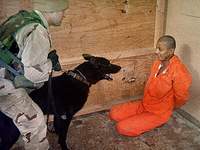Nudity was interrogation tactic used in Abu Ghraib prison
Army Lt. Col. Steven Jordan knew enough about Abu Ghraib prisoner abuse to report two instances of it, his lawyers say.

When asked why some of the detainees were naked in Abu Ghraib, Jordan said that nudity was a tactic used during interrogation.
Such contradictions are at center stage in Jordan's trial, which enters its third day Wednesday.
The 51-year-old army reservist is accused of creating an atmosphere for abuse at the prison in Iraq, where he was director of a newly formed interrogation center in the fall of 2003. He faces up to 8 1/2 years in prison if convicted on all four counts.
His alleged offenses include failing to train soldiers on interrogation rules, and illegally authorizing dogs for interrogations after a detainee shot at Jordan and some military police soldiers with a smuggled handgun on Nov. 24, 2003.
In the defense's opening statement Tuesday, Maj. Kris Poppe said the evidence would show that Jordan reported an incident in which two military intelligence soldiers tried to make a female detainee lift her shirt, and another in which a female interrogator escorted a partially nude male detainee back to his cell.
"He made sure misconduct was addressed," Poppe said.
Col. Thomas Pappas then verified the reported incidents from the witness stand.
Later Tuesday, Maj. Donald Reese, former commander of the 372nd Military Police Company, testified as a prosecution witness that when he asked Reese, shortly after arriving at the prison, why some of the detainees were naked, Reese it was an interrogation technique.
The testimony was some of the strongest evidence in support of a charge that Jordan willfully failed to train, supervise and ensure that soldiers under his control followed interrogation rules.
Reese also testified that Jordan asked the MPs on Nov. 24, 2003, to conduct a cell search that involved dogs. Jordan is accused of illegally authorizing the use of dogs for interrogations on that date. Reese didn't say whether Jordan requested the dogs, and on cross-examination he said the MPs weren't under Jordan's control.
Poppe tried to neutralize Reese's testimony by reminding the witness - and the jury - that Reese was reprimanded for his own leadership failure at Abu Ghraib; seven of his soldiers were convicted in the scandal.
Jordan's defense was bolstered by Pappas, another prosecution witness, who testified under cross-examination that Jordan did not fail to supervise or train interrogators on proper techniques, as the government alleges.
Pappas was commander of the 205th Military Intelligence Brigade in Iraq. He was reprimanded and fined $8,000 (EUR 5,922) for approving the use of dogs during an interrogation without higher approval.
Jordan is charged with disobeying an order barring him from discussing the investigation with others, an offense punishable by up to five years in prison; failure to obey a regulation, punishable by up to two years; cruelty and maltreatment of detainees, punishable by up to one year; and dereliction of duty, punishable by up to six months.
He is the only officer among the 12 people charged in the scandal, and the last to go to trial. Eleven enlisted soldiers have been convicted of crimes, with the longest sentence, 10 years, given to former Cpl. Charles Graner Jr. in January 2005.
Subscribe to Pravda.Ru Telegram channel, Facebook, RSS!


